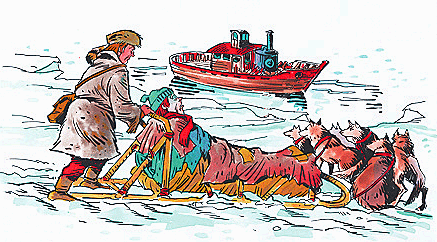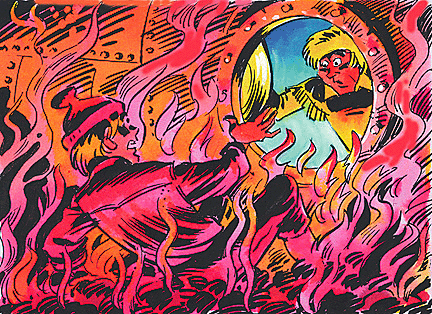Poem: The Cremation of Sam McGee
(an abnormal way of getting warm in the freezing conditions of a Canadian winter as expressed by Robert Service)
The Cremation of Sam McGee
by Robert W. Service
Why he left his home in the South to roam ‘round the Pole, God only knows.
He was always cold, but the land of gold seemed to hold him like a spell;
Though he’d often say in his homely way that “he’d sooner live in hell.”
Talk of your cold! through the parka’s fold it stabbed like a driven nail.
If our eyes we’d close, then the lashes froze till sometimes we couldn’t see;
It wasn’t much fun, but the only one to whimper was Sam McGee.
And the dogs were fed, and the stars o’erhead were dancing heel and toe,
He turned to me, and “Cap,” says he, “I’ll cash in this trip, I guess;
And if I do, I’m asking that you won’t refuse my last request.”
“It’s the cursed cold, and it’s got right hold till I’m chilled clean through to the bone.
Yet ‘taint being dead—it’s my awful dread of the icy grave that pains;
So I want you to swear that, foul or fair, you’ll cremate my last remains.”
And we started on at the streak of dawn; but God! he looked ghastly pale.
He crouched on the sleigh, and he raved all day of his home in Tennessee;
And before nightfall a corpse was all that was left of Sam McGee.
With a corpse half hid that I couldn’t get rid, because of a promise given;
It was lashed to the sleigh, and it seemed to say: “You may tax your brawn and brains,
But you promised true, and it’s up to you to cremate those last remains.”
In the days to come, though my lips were dumb, in my heart how I cursed that load.
In the long, long night, by the lone firelight, while the huskies, round in a ring,
Howled out their woes to the homeless snows—O God! how I loathed the thing.
And on I went, though the dogs were spent and the grub was getting low;
The trail was bad, and I felt half mad, but I swore I would not give in;
And I’d often sing to the hateful thing, and it hearkened with a grin.

It was jammed in the ice, but I saw in a trice it was called the “Alice May.”
And I looked at it, and I thought a bit, and I looked at my frozen chum;
Then “Here,” said I, with a sudden cry, “is my cre-ma-tor-eum.”
Some coal I found that was lying around, and I heaped the fuel higher;
The flames just soared and the furnace roared—such a blaze you seldom see;
And the heavens scowled, and the huskies howled, and the wind began to blow.
It was icy cold, but the hot sweat rolled down my cheeks, and I don’t know why;
And the greasy smoke in an inky cloak went streaking down the sky.
But the stars came out and they danced about ere again I ventured near;
I was sick with dread, but I bravely said: “I’ll just take a peep inside.
I guess he’s cooked, and it’s time I looked;” . . . then the door I opened wide.

And he wore a smile you could see a mile, and he said: “Please close that door.
It’s fine in here, but I greatly fear you’ll let in the cold and storm—
Since I left Plumtree, down in Tennessee, it’s the first time I’ve been warm.”
Robert Service Biographical Sketch
Robert W. Service, a Canadian poet and novelist, was known for his ballads of the Yukon. He wrote this narrative poem which is presented here because it is an outstanding example of how sensory stimuli are emphasized and it has a surprise ending.
Robert William Service was born in Preston, England, on January 16, 1874. He emigrated to Canada at the age of twenty, in 1894, and settled for a short time on Vancouver Island. He was employed by the Canadian Bank of Commerce in Victoria, B.C., and was later transferred to Whitehorse and then to Dawson in the Yukon.
In all, he spent eight years in the Yukon and saw and experienced the difficult times of the miners, trappers, and hunters that he has presented to us in verse.
During the Balkan War of 1912-13, Service was a war correspondent for the Toronto Star. He served this paper in the same capacity during World War I, also serving two years as an ambulance driver in the Canadian Army medical corps. He returned to Victoria for a time during World War II, but later lived in retirement on the French Riviera, where he died on September 14, 1958, in Monte Carlo.
Sam McGee was a real person, a customer at the Bank of Commerce where Service worked. The Alice May was a real boat, the Olive May, a derelict on Lake Laberge.
Anyone who has experienced the bitterness of cold weather and what it can do to a person will empathize with Sam McGee’s feelings as expressed by Robert Service in his poem, The Cremation of Sam McGee.
More poems are listed at this Poems: Index.
![]() Also see this list of cremation words.
Also see this list of cremation words.
